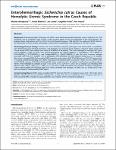Enterohemorrhagic Escherichia coli as Causes of Hemolytic Uremic Syndrome in the Czech Republic
Marejková, Monika
Bláhová, Květa
Janda, Jan
Fruth, Angelika
Petráš, Petr
Background: Enterohemorrhagic Escherichia coli (EHEC) cause diarrhea-associated hemolytic uremic syndrome (D+ HUS) worldwide, but no systematic study of EHEC as the causative agents of HUS was performed in the Czech Republic. We analyzed stools of all patients with D+ HUS in the Czech Republic between 1998 and 2012 for evidence of EHEC infection. We determined virulence profiles, phenotypes, antimicrobial susceptibilities and phylogeny of the EHEC isolates. Methodology/Principal Findings: Virulence loci were identified using PCR, phenotypes and antimicrobial susceptibilities were determined using standard procedures, and phylogeny was assessed using multilocus sequence typing. During the 15-year period, EHEC were isolated from stools of 39 (69.4%) of 56 patients. The strains belonged to serotypes [fliC types] O157:H7/NM[fliCH7] (50% of which were sorbitol-fermenting; SF), O26:H11/NM[fliCH11], O55:NM[fliCH7], O111:NM[fliCH8], O145:H28[fliCH28], O172:NM[fliCH25], and Orough:NM[fliCH25]. O26:H11/NM[fliCH11] was the most common serotype associated with HUS (41% isolates). Five stx genotypes were identified, the most frequent being stx2a (71.1% isolates). Most strains contained EHEC-hlyA encoding EHEC hemolysin, and a subset (all SF O157:NM and one O157:H7) harbored cdt-V encoding cytolethal distending toxin. espPα encoding serine protease EspPα was found in EHEC O157:H7, O26:H11/NM, and O145:H28, whereas O172:NM and Orough:NM strains contained espPγ. All isolates contained eae encoding adhesin intimin, which belonged to subtypes β (O26), γ (O55, O145, O157), γ2/θ (O111), and ε (O172, Orough). Loci encoding other adhesins (efa1, lpfAO26, lpfAO157OI-141, lpfAO157OI-154, iha) were usually associated with particular serotypes. Phylogenetic analysis demonstrated nine sequence types (STs) which correlated with serotypes. Of these, two STs (ST660 and ST1595) were not found in HUS-associated EHEC before. Conclusions/Significance: EHEC strains, including O157:H7 and non-O157:H7, are frequent causes of D+ HUS in the Czech Republic. Identification of unusual EHEC serotypes/STs causing HUS calls for establishment of an European collection of HUS-associated EHEC, enabling to study properties and evolution of these important pathogens.
No license information
Related Items
Show related Items with similar Title, Author, Creator or Subject.
-
2015-07-31ZeitschriftenartikelHighly Virulent Non-O157 Enterohemorrhagic Escherichia coli (EHEC) Serotypes Reflect Similar Phylogenetic Lineages, Providing New Insights into the Evolution of EHEC Eichhorn, Inga; Heidemanns, Katrin; Semmler, Torsten; Kinnemann, Bianca; Mellmann, Alexander; Harmsen, Dag; Anjum, Muna F.; Schmidt, Herbert; Fruth, Angelika; Valentin-Weigand, Peter; Heesemann, Jürgen; Suerbaum, Sebastian; Karch, Helge; Wieler, Lothar H.Enterohemorrhagic Escherichia coli (EHEC) is the causative agent of bloody diarrhea and extraintestinal sequelae in humans, most importantly hemolytic-uremic syndrome (HUS) and thrombotic thrombocytopenic purpura (TTP). ...
-
2008-08-01ZeitschriftenartikelAnalysis of collection of hemolytic uremic syndrome-associated enterohemorrhagic Escherichia coli. Mellmann, Alexander; Bielaszewska, Martina; Köck, Robin; Friedrich, Alexander W.; Fruth, Angelika; Middendorf, Barbara; Harmsen, Dag; Schmidt, M. Alexander; Karch, HelgeMultilocus sequence typing of 169 non-O157 enterohemorrhagic Escherichia coli (EHEC) isolated from patients with hemolytic uremic syndrome (HUS) demonstrated 29 different sequence types (STs); 78.1% of these strains clustered ...
-
2011-07-20ZeitschriftenartikelProspective genomic characterization of the German enterohemorrhagic escherichia coli O104:H4 outbreak by rapid next generation sequencing technology. Mellmann, Alexander; Harmsen, Dag; Cummings, Craig A.; Zentz, Emily B.; Leopold, Shana R.; Rico, Alain; Prior, Karola; Szczepanowski, Rafael; Ji, Yongmei; Zhang, Wenlan; McLaughlin, Stephen F.; Henkhaus, John K.; Leopold, Benjamin; Bielaszewska, Martina; Prager, Rita; Brzoska, Pius M.; Moore, Richard L.; Guenther, Simone; Rothberg, Jonathan M.; Karch, HelgeAn ongoing outbreak of exceptionally virulent Shiga toxin (Stx)-producing Escherichia coli O104:H4 centered in Germany, has caused over 830 cases of hemolytic uremic syndrome (HUS) and 46 deaths since May 2011. Serotype ...

